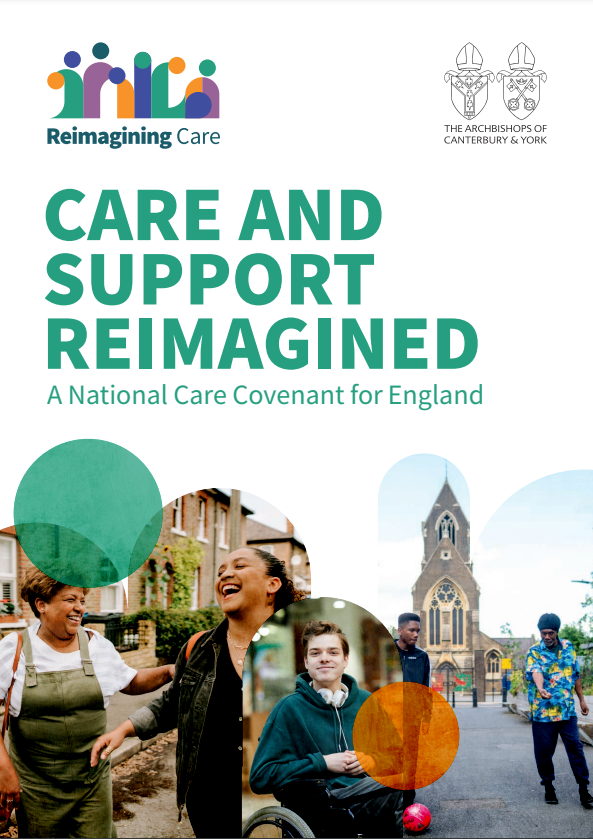Care and Support Reimagined: ‘A National Care Covenant for England’ – A TSA Analysis
By Tim Dawson, TSA Policy & Research Officer
09 February 2023
The Reimaging Care Commission was set up in April 2021 by the Archbishops of Canterbury and York. Its aim was to review the current state of care and support in England and put forward proposals to realign systems, along with associated attitudes, to better represents Christian theology and values. “Care and Support Reimagined: A National Care Covenant for England”, released on 23rd January 2023, is the result and calls for a values-driven Care and Support system.
The central ideas and goals of the report are:
- To create a revolution around the attitudes held around care.
- To create a “social covenant” that explains the roles and necessary contributions of people, communities, and the government to create this values-driven care and support system.
- To bring a “radical redesign of the system” that shifts the focus away from money and onto the needs and wishes of the individual who draws on care and support.
One focus of the report is the need to recognise the uniqueness of individuals who draw on care and support and their situation. No two people are the same. They may have the same health condition and very similar physical symptoms, but their experience of these are different and their goals and desires for care and support will be different too. The commission therefore calls to involve individuals in their own care planning, shifting care and support to be more person-centred. It stresses the importance of treating those who draw on care and support as independent people with individual goals and aspirations, as well as needs.
The report mentions how technology can be used to help people remain independent for longer, often in their own homes. It enables individuals to do the things they want to do, whilst having support at hand if needed. Technology Enabled Care (TEC) packages can range in the amount of support provided and, when utilised with sufficient resources, are highly adaptable to an individual’s needs and requests.
Proactive and preventative TEC services provide support before it is desperately needed, meaning individuals are less likely to suffer from avoidable incidents and therefore less likely to be forced out of their normal day-to-day activities and communities. An avoidable fall can have catastrophic impacts and start a spiral of decline that separates the individual from their desired way of life. Using TECS can therefore ensure care and support is person-centred by helping to prevent these events, which ensures the person can continue living however they want.
Creating a more personalised approach to care and support should open the door to further TEC implementations and enable people to live the life that they want, for as long as possible.
This analysis ties in with work that TSA are currently undertaking; we are due to release a co-produced definition of personalisation in the TEC Sector at the ITEC Conference on 27th & 28th March. The aim is to contextualise personalisation for TEC services and organisations within a green paper entitled ‘What do people want from technology-enablement of care, and how can the benefits be delivered?’. Within this paper, we reference how we plan to promote the voice of people with lived experience of TEC into all our activities by embedding coproduction within the QSF and TSA’s ways of working. We are also doing work to help develop proactive and preventative TEC services through a service specification, with the results of this work due to be released in July 2023.
A key enabler for more personalised care and support, that is highlighted in the Commission’s report, is the need for more integrated service provision. Broadening the scope of “Social Care” to encompass all aspects of care, from technical health analysis and consultation to emotional and social support through communities, is essential for effective care and support. The report explains how the best examples of ‘good care’ currently are those that have implemented fluid partnership working between Health, Care, Housing, and TEC teams alongside community groups. Partnership working through integrated health and care teams, working with the individual, their friends, family, and community, creates faster and more personalised access to care and support.
Including TECS into these pathways, through opening conversations and sharing the benefits of TEC with Health, Care, Housing, and Community Group colleagues, will help ensure the most appropriate care and support is available to everyone. As many know in the TEC sector, the benefits and developments of TEC may often not be fully understood by related services.
To help drive this understanding forward, TSA are working to embed the adoption of integrated models in these settings by aligning the Quality Standards Framework with other care regulators across the UK. We are also working to publish evidence on the benefits of TEC to commissioners by March 2024. More information can be found in the 2023-2025 TSA Business Plan.
This only scratches the surface of the report’s findings and calls for actions. To find out more, the full report is available here and a summarised version is available here. More information on TSA’s goals and planned work can be found in the 2023-2025 TSA Business Plan.








